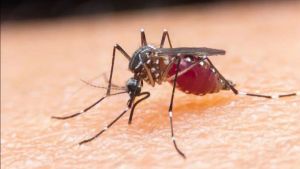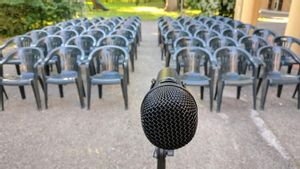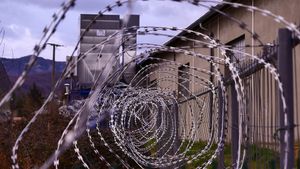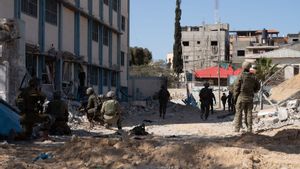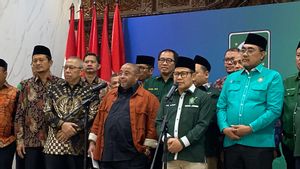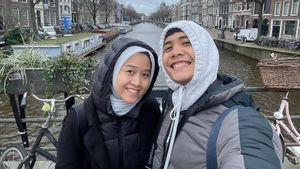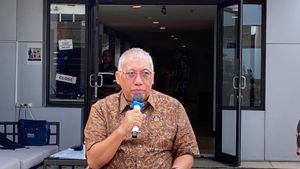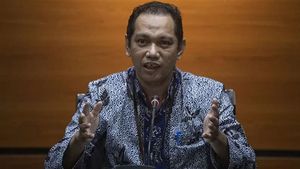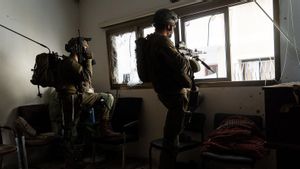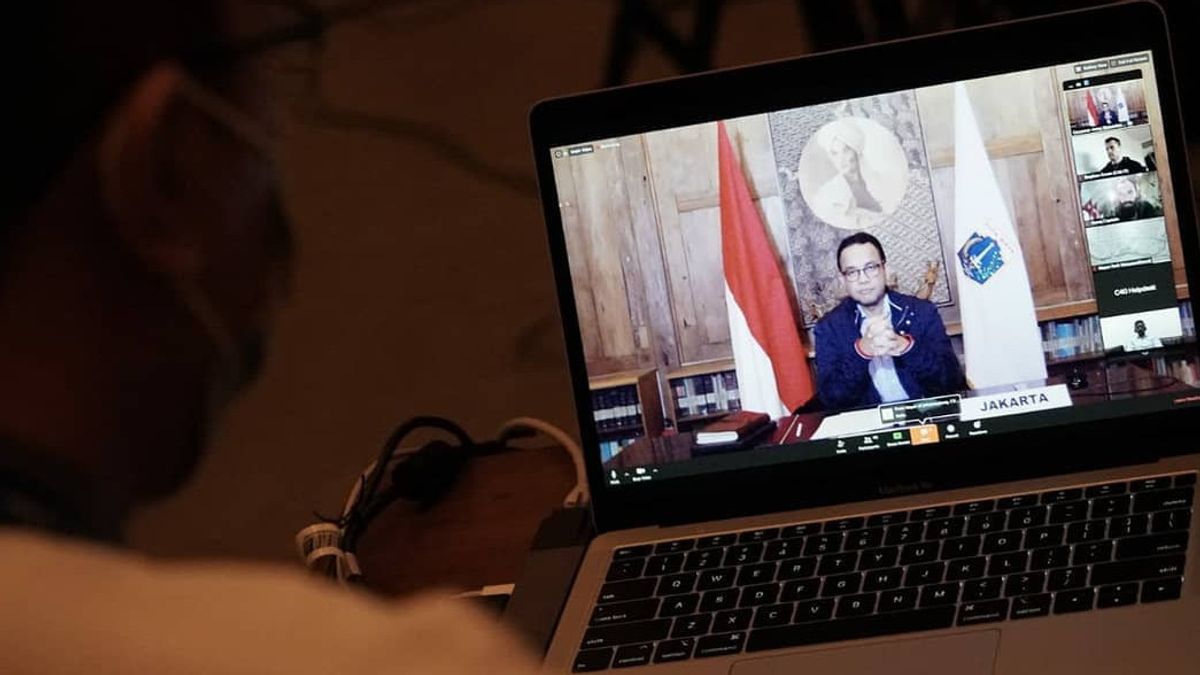
JAKARTA - The capital city officially enforces the Big Bound Social Restrictions (PSBB) today. DKI Jakarta Governor Anies Baswedan has issued Governor Regulation Number 33 of 2020 which regulates the implementation of the PSBB.
Anies explained that the PSBB is valid for 2 weeks, namely from today, April 10 to April 23 and can be extended. Broadly speaking, there are several parts that are regulated in Pergub No. 33/2020, namely implementation, rights and obligations, and sanctions for violators.
"For the next 2 weeks, all people in Jakarta are expected to stay in their home environment and reduce and eliminate activities outside. In principle, this PSBB aims to cut the chain of transmission of COVID-19," said Anies at the City Hall of DKI, Central Jakarta, Thursday, April 9 evening.
In implementing the PSBB, Anies prohibited people from gathering more than five people in public places. the goal is to reduce the potential for interaction. Anies also extended the policy period for implementing work and studying at home, stopping religious activities, closing tourist attractions, and limiting the intensity of transportation.
There are several sectors of work that are still allowed to have activities in the workplace, namely all government offices, both central and regional, representative offices of foreign countries or international organizations, and State / Regional Owned Enterprises.
Then, several business actors or private offices who are still allowed to do activities include, among others, the health sector, food / food / beverage, energy, communication and information technology, finance, logistics, hospitality, construction, strategic industries, basic services, public utilities and industry. which are designated as national vital objects and certain objects. In addition, local and international community organizations engaged in the disaster and / or social sectors are still allowed to operate.
Food, food, or beverage businesses such as restaurants are still allowed to operate, but all purchases must be wrapped and no one is allowed to eat the food on site. Restaurant owners must apply the principle of maintaining a line between standing and sitting at least one meter between customers and implementing sanitation policies both before and after serving food.
"All food is taken and taken home. There is no dine-in, you have to take away or delivery. The point is not to stop the restaurant's business activities, but to stop the interaction between people in the restaurant," said Anies.
Especially for construction work, Anies asked construction workers to remain in the project environment. So that workers do not go out of the project environment, Anies asked the manager to prepare a place to live, eat, drink and health facilities.
"Thus, they do not have to leave the construction project site," said Anies.
Transport restrictions
Anies did not prohibit transportation access, both from Jakarta to outside the region and vice versa. Then, private vehicles that are still allowed to travel are only to fulfill basic needs and do work for a number of work sectors that are still allowed to operate outside. This applies to two-wheeled vehicles and four or more wheels.
Meanwhile, for four-wheeled vehicles or more, the number of passengers is reduced by 50 percent. "If the number of seats in the car is 6 people, it can be for 3 people, and everyone must wear a mask," said Anies.
Then, two-wheeled transportation such as online motorcycle taxis is prohibited from carrying people (passengers). "We arrange motorcycle taxis in accordance with the guidelines, namely goods expedition services including application-based two-wheeled transportation facilities with restrictions only for carrying goods and not for transporting passengers," said Anies.
Previously, this had left Anies in a dilemma. In the PSBB guidelines by the Minister of Health, it is clear that online motorcycle taxis are not allowed to carry passengers. However, before issuing the governor's regulation, Anies wanted the ojol to still be able to carry passengers.
However, it could not possibly be permitted by the Minister of Health. Because, if the Minister of Health grants Anies's request, the Minister of Health's Regulation on PSBB must be revised.
"Because there has been no change in the health minister's regulation, the governor's regulation must be in line with the reference to Permeknkes Number 9 of 2020 concerning PSBB Guidelines for the Acceleration of Handling COVID-19," explained Anies.
In addition, Anies requires all vehicles, both public and private modes of transportation to reduce the number of passengers by 50 percent in one vehicle. Then, all public transportation experiences a reduction in operating time, which starts at 6:00 a.m. to 6:00 p.m. WIB.
View this post on InstagramDKI Jakarta is still in the COVID-19 Disaster Emergency Response status until Sunday, April 19, 2020, friends should keep doing activities at home. For friends who are still out of the house, you must wear a mask to prevent the spread of COVID-19. Starting today, Monday 6 April 2020, all modes of public transportation in Jakarta will socialize the MANDATORY MASK rules. Strict enforcement of the rules starting April 12, 2020, only passengers wearing masks can ride the TransJakarta, MRT, LRT, commuter trains and airport trains. Don't wear medical / surgical masks, it is very necessary for health workers. Just use a cloth mask of at least 3 layers, or two layers in which a tissue is inserted. Cheap and easy cloth masks, can be made yourself with ingredients at home or help local MSMEs by buying cloth masks from them online. Buy a few lots to be used in turns. If you have extra cloth masks, distribute them to those who are not wearing them around you. Protect yourself, protect your family, and protect others. #jakartatanggapcorona #yukpakaimasker #jaklingko #Transjakarta #MRTJakarta #LRTJakarta #KeretaCommuterIndonesia #railink #maskerkain # covid19
Sanctions for violating
When there is a prohibition rule, of course there are sanctions behind it if it violates. Anies said, violations of the implementation of the PSBB are subject to sanctions in accordance with statutory provisions including criminal sanctions. Starting from light punishment, and can be heavier if the prohibition is violated repeatedly.
The sanctions are regulated in Article 93 of Law Number 6 Year 2018 concerning Health Quarantine. In this regulation, violators can be subject to a maximum imprisonment of one year and / or a maximum fine of Rp. 100 million.
"We will work on the process together with law enforcement officials to ensure that all of these provisions are implemented, in which a maximum penalty of one year and a maximum fine of Rp100 million can be imposed," Anies concluded.
The English, Chinese, Japanese, Arabic, and French versions are automatically generated by the AI. So there may still be inaccuracies in translating, please always see Indonesian as our main language. (system supported by DigitalSiber.id)
Most Popular Tags
#Prabowo Subianto #Constitutional Court #israel #iran #Mooryati Soedibyo
Popular
26 April 2024, 06:0026 April 2024, 06:25


